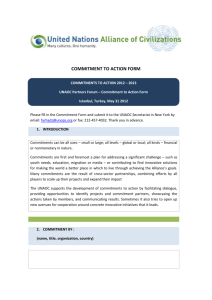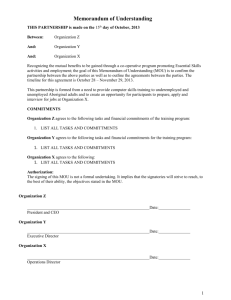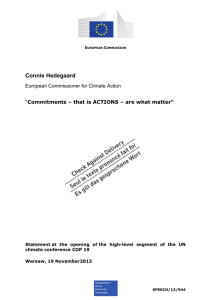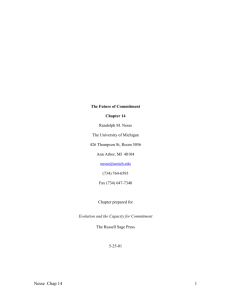Printable Summary
advertisement
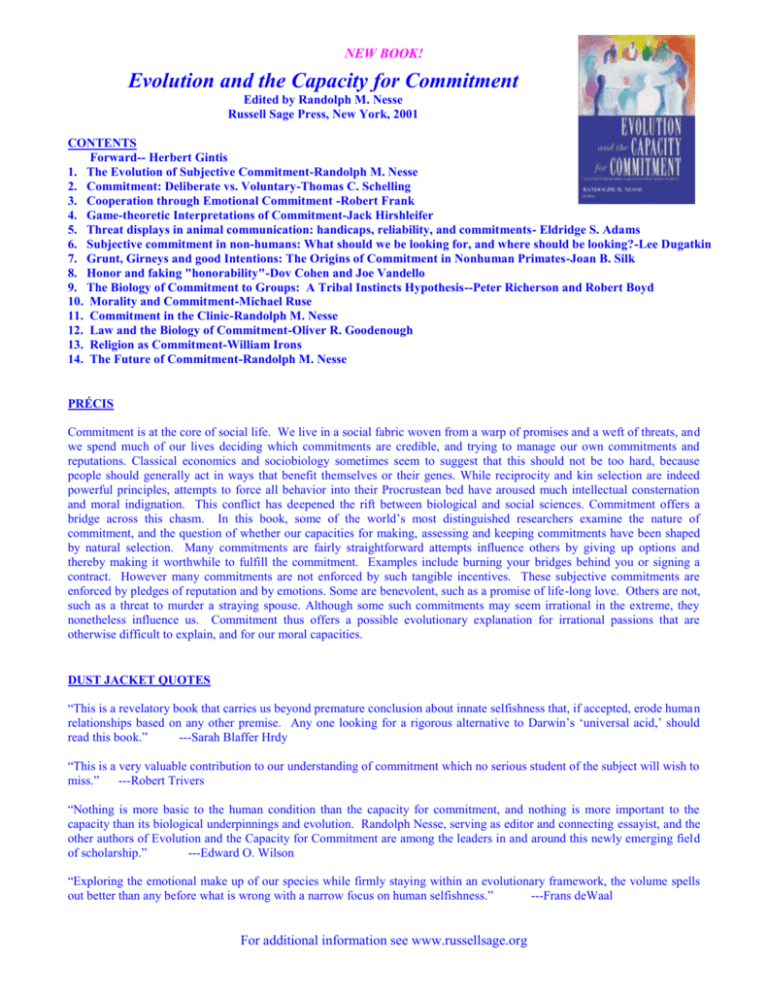
NEW BOOK! Evolution and the Capacity for Commitment Edited by Randolph M. Nesse Russell Sage Press, New York, 2001 CONTENTS Forward-- Herbert Gintis 1. The Evolution of Subjective Commitment-Randolph M. Nesse 2. Commitment: Deliberate vs. Voluntary-Thomas C. Schelling 3. Cooperation through Emotional Commitment -Robert Frank 4. Game-theoretic Interpretations of Commitment-Jack Hirshleifer 5. Threat displays in animal communication: handicaps, reliability, and commitments- Eldridge S. Adams 6. Subjective commitment in non-humans: What should we be looking for, and where should be looking?-Lee Dugatkin 7. Grunt, Girneys and good Intentions: The Origins of Commitment in Nonhuman Primates-Joan B. Silk 8. Honor and faking "honorability"-Dov Cohen and Joe Vandello 9. The Biology of Commitment to Groups: A Tribal Instincts Hypothesis--Peter Richerson and Robert Boyd 10. Morality and Commitment-Michael Ruse 11. Commitment in the Clinic-Randolph M. Nesse 12. Law and the Biology of Commitment-Oliver R. Goodenough 13. Religion as Commitment-William Irons 14. The Future of Commitment-Randolph M. Nesse PRÉCIS Commitment is at the core of social life. We live in a social fabric woven from a warp of promises and a weft of threats, and we spend much of our lives deciding which commitments are credible, and trying to manage our own commitments and reputations. Classical economics and sociobiology sometimes seem to suggest that this should not be too hard, because people should generally act in ways that benefit themselves or their genes. While reciprocity and kin selection are indeed powerful principles, attempts to force all behavior into their Procrustean bed have aroused much intellectual consternation and moral indignation. This conflict has deepened the rift between biological and social sciences. Commitment offers a bridge across this chasm. In this book, some of the world’s most distinguished researchers examine the nature of commitment, and the question of whether our capacities for making, assessing and keeping commitments have been shaped by natural selection. Many commitments are fairly straightforward attempts influence others by giving up options and thereby making it worthwhile to fulfill the commitment. Examples include burning your bridges behind you or signing a contract. However many commitments are not enforced by such tangible incentives. These subjective commitments are enforced by pledges of reputation and by emotions. Some are benevolent, such as a promise of life-long love. Others are not, such as a threat to murder a straying spouse. Although some such commitments may seem irrational in the extreme, they nonetheless influence us. Commitment thus offers a possible evolutionary explanation for irrational passions that are otherwise difficult to explain, and for our moral capacities. DUST JACKET QUOTES “This is a revelatory book that carries us beyond premature conclusion about innate selfishness that, if accepted, erode human relationships based on any other premise. Any one looking for a rigorous alternative to Darwin’s ‘universal acid,’ should read this book.” ---Sarah Blaffer Hrdy “This is a very valuable contribution to our understanding of commitment which no serious student of the subject will wish to miss.” ---Robert Trivers “Nothing is more basic to the human condition than the capacity for commitment, and nothing is more important to the capacity than its biological underpinnings and evolution. Randolph Nesse, serving as editor and connecting essayist, and the other authors of Evolution and the Capacity for Commitment are among the leaders in and around this newly emerging field of scholarship.” ---Edward O. Wilson “Exploring the emotional make up of our species while firmly staying within an evolutionary framework, the volume spells out better than any before what is wrong with a narrow focus on human selfishness.” ---Frans deWaal For additional information see www.russellsage.org




